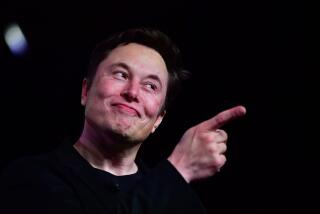Would Perot Be a Good President?
Between Lyndon B. Johnson and George Bush, Americans have already elected two self-proclaimed “Texas entrepreneurs” to the White House. Will Ross Perot make three?
Of course, Perot is a real Texas entrepreneur, a superb salesman, motivator and innovator who likes to describe himself (with a twang) as the “irritant” that gets the oyster to create the pearl. Perot viscerally understands that innovation isn’t a product of intellect but an act of will.
Unlike many billionaire (and poorer) entrepreneurs, Perot always managed to place his considerable ego in context. During interviews, he consistently acknowledges key individuals in his management team for his organization’s successes. With no hokum or false modesty, he rigorously credits his own success to hiring people who are smarter than he is.
But does Perot’s high-energy entrepreneurial nature and flair provide the ingredients for political success? Consider:
* Perot tries to persuade his managers at IBM to launch a new business: facilities management. Unsuccessful, he leaves to create EDS.
* Perot can’t get the U.S. government to help free his EDS employees imprisoned in Iran. So he creates his own guerrilla force to free them.
* Dissatisfied with the public high school system in Texas, Perot heads up a special task force to enact fundamental changes.
* After EDS is acquired by GM, Perot tries to get the auto giant to mend its inadequate ways. He fails and leaves.
* He leaves the President’s Foreign Intelligence Advisory Board, describing it as a “do-nothing” organization.
* Unhappy with how America and its institutions are being run, Perot launches an independent campaign for the presidency.
Do you see a pattern here? The instinct of the entrepreneur isn’t to modify what exists--it’s to create something new. Perot is such a bred-in-the-bone entrepreneur that he only seems comfortable with established institutions if he’s trying to change them. Historically, most institutions simply reject external entrepreneurs that are grafted on in hopes of fomenting meaningful change.
For want of a better term, Perot is just not an institutionalist. While he is unquestionably a master of the ex parte and ad hoc venture, his track record as someone who can inspire people to transform an existing institution is poor. Unlike General Electric’s Jack Welch or Procter & Gamble’s John Smale, who demonstrably know how to trigger radical transformations in existing enterprises, Perot’s medium of innovation seems to be the entrepreneurial enterprise.
Indeed, if Perot really knew how to tap an institution’s desire and need for change, he’d now be the chairman of IBM or GM (or the chairman of both).
That’s not to say that Perot couldn’t be a brilliant President. Anybody who’s made a career of surrounding himself with smart people and motivating them to perform at levels beyond their expectations shouldn’t be cavalierly dismissed.
But when you look at the history of entrepreneurs trying to turn themselves into institution leaders--or, for that matter, institutionalists trying to turn themselves into entrepreneurs--you realize that there are strong cultural reasons why politicians such as Johnson, Ronald Reagan and Bush are elected President. These are individuals who intuitively know how to cultivate institutions from within, not by being entrepreneurs trying to create new institutions.
But precisely because entrepreneurs are best at creating the new, the political Establishment had better be careful. With Ross Perot, they’ll find a man who loves to kick the stuffing out of the status quo.
Michael Schrage is a writer, consultant and research associate at the Massachusetts Institute of Technology. He writes this column independently for The Times.
More to Read
Get the L.A. Times Politics newsletter
Deeply reported insights into legislation, politics and policy from Sacramento, Washington and beyond. In your inbox three times per week.
You may occasionally receive promotional content from the Los Angeles Times.










